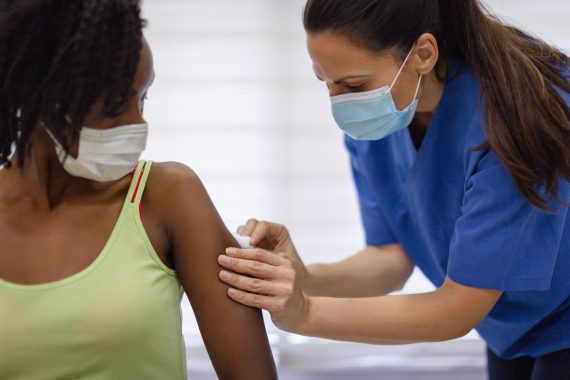GPs given 12-week respite before certifying care home jab exemptions

Care home workers who are medically exempt from having a Covid-19 jab will be able to self-certify on a temporary basis, new guidance has said.
For 12 weeks, staff who can’t have a Covid-19 vaccine for medical reasons will be able to do a self-certification process for their employer.
The Department of Health and Social Care said the measures had been introduced for a ‘short period’ but would be replaced by the NHS COVID Pass system which is in development by NHS Digital.
Once the formal system is in place, people working or volunteering in care homes will need to apply for a formal medical exemption through that process, which will be subject to approval by a GP or specialist, the DHSC said.
It added that details on the formal medical exemptions process will be set out shortly.
Operational guidance published in August after new regulations that staff in care homes – or those visiting them, including GPs – will be subject to mandatory vaccinations had said there would be ‘clear process’ for staff who believe they are clinically exempt.
There had already been suggestions that GPs may have to provide the evidence for staff who were medically exempt.
In a letter to local authorities and care home managers, the DHSC said as of 9 September, 90.4% of care home workers have had a first dose of a Covid-19 vaccine and 82.2% are double jabbed.
‘On a temporary basis, from today, people working or volunteering in care homes who have a medical reason why they are unable to have a Covid-19 vaccine will be able to self-certify that they meet the medical exemption criteria, using the forms attached to this letter,’ it said.
‘This temporary self-certification process has been introduced for a short period prior to the launch of the new NHS Covid Pass system which will go live imminently. Once the NHS Covid Pass system is launched, care home workers will need to apply for a formal medical exemption through that process,’ it said.
The list of medical exemptions includes medical contraindications to vaccines or people who have had adverse reaction, such as myocarditis, after their first dose.
It would also include people with learning disabilities or autistic individuals who find vaccination and testing distressing because of their condition.
Time-limited exemptions will be available for those with short-term medical conditions, for example if they are receiving hospital care which means they cannot have the vaccine at the moment.
The BMA raised concerns two months ago that GPs would be expected to verify the requests.
In a bulletin sent to BMA members on 28 June it said: ‘The Government has said that a small number of people would be exempt and suggested that individuals may be directed to their GP to provide evidence, but we do not believe this should be the approach.’
It comes as the DHSC has set out a proposal for mandatory Covid certification for members of the public if ‘plan B’ of its winter plan is actioned.
The proposal would see the public required to present an NHS Covid Pass in certain scenarios and settings, including nightclubs, large indoor events and large and crowded outdoor events.
In a policy paper published yesterday, the DHSC said that medical exemptions will be ‘clinically reviewed’ by the ‘clinician providing an individual’s care’.
It said that a ‘small proportion of people who should not be vaccinated for medical reasons’ and whose exemption ‘has been clinically reviewed’ will be ‘exempt from vaccination’, alongside UK Covid vaccine clinical trial participants and some overseas trial participants.
It added: ‘Some conditions may lead to an exemption when the condition is severe, but not in less severe cases. Each application for exemption will therefore be reviewed by the clinician providing an individual’s care.
‘Examples of conditions that indicate exemption include those with severe allergy to all Covid-19 vaccines, those with learning disabilities and those who had an adverse reaction to the first dose of the vaccine.’
‘Time-limited’ exemptions would be made available for those with short-term conditions, it said.
The DHSC added that it will ‘set out further details on how individuals should apply for medical exemptions and how these will be clinically reviewed shortly’.
It remains unclear whether GPs will be responsible for certifying these exemptions and how this process will work.
The DHSC declined to clarify and reiterated that further details on the medical exemptions policy will follow.
Pulse October survey
Take our July 2025 survey to potentially win £1.000 worth of tokens

Visit Pulse Reference for details on 140 symptoms, including easily searchable symptoms and categories, offering you a free platform to check symptoms and receive potential diagnoses during consultations.










